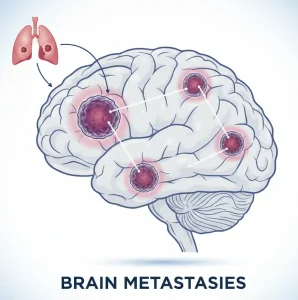Overview
Diagnosis of Brain Metastases
To diagnose brain metastases, your healthcare professional evaluates your symptoms and medical history. Diagnostic tests may include:
-
Neurological exam: Assesses cognition, speech, vision, hearing, balance, coordination, strength, sensation, and reflexes.
-
Imaging tests:
-
MRI (Magnetic Resonance Imaging): Main test for locating and sizing brain metastases. A dye may be injected to enhance images.
-
CT scan (Computed Tomography) and PET scan (Positron Emission Tomography) may also be used for additional information.
-
-
Biopsy: Tissue is removed with a needle or during surgery to confirm the diagnosis in a lab.
Treatment of Brain Metastases
Treatment aims to ease symptoms, slow tumor growth, and extend life. Choices depend on tumor type, size, number, location, symptoms, and overall health.
Medicines to Control Symptoms
-
Steroids (Corticosteroids): Reduce brain swelling caused by metastases.
-
Anti-seizure drugs: Help control seizures.
Surgery
-
Tumor removal: Considered if the tumor is easily reachable and fits into the overall cancer care plan.
-
Surgery aims to improve symptoms and aid diagnosis and is often combined with other treatments.
-
Risks may include cognitive changes, motor difficulties, numbness, infection, or bleeding, depending on tumor location.
Radiation Therapy
-
Whole-brain radiation: Targets the entire brain to kill tumor cells, usually over 10–15 treatments in 2–3 weeks. Side effects include fatigue, nausea, headaches, hair loss, and possible long-term cognitive decline.
-
Stereotactic radiosurgery (SRS): Focused radiation from multiple angles targets the tumor with 3D planning to minimize damage to healthy tissue. Typically requires one or a few sessions. Side effects may include nausea, headache, seizures, or dizziness.
Medicines for Cancer Treatment
-
Chemotherapy: Uses strong cancer-fighting drugs, usually through IV or pills.
-
Targeted therapy: Attacks specific chemicals in cancer cells to trigger cell death.
-
Immunotherapy: Boosts the body’s immune system to recognize and destroy cancer cells.
Rehabilitation After Treatment
Recovery may involve rehabilitative therapies if the tumor affected movement, speech, vision, or thinking:
-
Physical therapy: Regains strength, coordination, balance, and movement.
-
Occupational therapy: Helps return to daily activities, such as work.
-
Speech therapy: Assists with speaking difficulties.
-
Cognitive rehabilitation therapy: Supports memory, attention, word recall, and mood management.
Palliative Care
-
Purpose: Provides supportive care to relieve symptoms and improve quality of life during cancer treatment.
-
Team approach: Involves doctors, nurses, and trained professionals.
-
Can be provided alongside surgery, radiation therapy, or chemotherapy.
Advertisement

